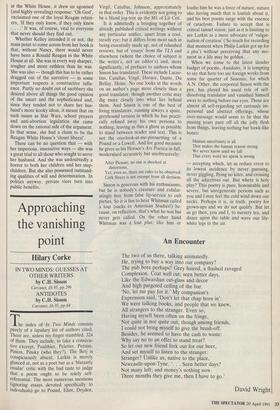Approaching the vanishing point
Hilary Corke
IN TWO MINDS: GUESSES AT OTHER WRITERS by C.H. Sisson
Carcanet, £6.95, pp.296
ANTIDOTES by C.H. Sisson
Carcanet, £6.95, pp.64
The index of In Two Minds consists purely of a lapidary list of authors cited. There are, unless my finger stumbled, 324 of them. They include, to take a consecu- tive excerpt, Paulthier, Peletier, Persius, Pinion, Pinsky (who they?). The Betj is conspicuously absent. Larkin is merely glanced at, not as a poet but as a 'blatantly Insular' critic with the bad taste to judge that a poem ought to be solely self- referential. The most numerous mentions (ignoring essays devoted specifically to individuals) go to Pound, Eliot, Dryden, Virgil, Catullus, Johnson, approximately in that order. This is evidently not going to be a bland jog-trot up the M1 of Lit Crit.
It is admittedly a bringing together of already published critical writings without any particular unifier, apart from a cool, steady eye; but it differs from most such in being essentially made up, not of rehashed reviews, but of 'essays' from the TLS and elsewhere (where the choice of subject is the writer's, not an editor's) and, more significantly, of prefaces to authors whom Sisson has translated. These include Lucre- tius, Catullus, Virgil, Horace, Dante, Du Bellay, Heine. No one looks at the words on an author's page more closely than a good translator, though another critic may dig more closely into what lies behind them. And Sisson is one of the best of living translators, running always a spare, greyhound version in which he has practi- cally refined away his own persona to nothing, leaving as thin a ghost as possible to stand between reader and text. This is not the coo-look-at-me-pirouetting of a Pound or a Lowell. And for good measure he gives us his Horace's Ars Poetica in full, modernised accurately but unobtrusively:
After Picasso, no one is shocked at distortions, Yet, even so, there are rules to be observed: Cork Street is not exempt from all derision.
Sisson is generous with his enthusiasms, but he is nobody's creature and exhilar- atingly free from false lip-service to cult pieties. So it is fun to hear Whitman called a lout (sucks to American Studies!) be- cause, on reflection, that's what he was but never gets called. On the other hand Whitman was a lout plus: like him or loathe him he was a force of nature, nature also having much that is loutish about it, and his best poems surge with the essence of cataclysm. Failure to accept that is critical tunnel vision, just as it is limiting to see Larkin as a mere advocate of 'vulgar- isation of creation' (`So much for recording that moment when Philip Larkin got up for a piss') without perceiving that any mo- ment in a life may be golden.
When we come to the latest slender budget of poems, Antidotes, it is tempting to say that here too are foreign works from some far quarter of Sissonia; for which A.N. Other, the corporeal Sisson with the pen, has played his usual role of self- dissolving translator and vanished himself away to nothing before our eyes. These are almost all self-regarding yet curiously im- personal and abstract offerings, whose over-message would seem to be that the passing years pare off all the jolly flesh from things, leaving nothing but hawk-like bones:
Human uncertainty is all That makes the human reason strong: We never know until we fall That every word we speak is wrong
— accepting which, let us reduce error to its lowest incidence by never guessing, never giggling, flying no kites, and crossing all the adjectives out. But where is holy play? This poetry is pure, honourable and severe, but unregenerate persons such as you and I may feel the cold wind down our necks. Perhaps it is, in truth, poetry for grown-ups and we do not qualify. But let us go then, you and I, to nursery tea, and dance upon the table and wave our lily- white legs in the air.


























































 Previous page
Previous page